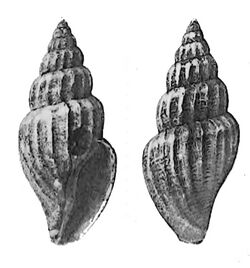Biology:Propebela scalaris
From HandWiki
Revision as of 20:36, 22 July 2021 by imported>MainAI5 (linkage)
Short description: Species of gastropod
| Propebela scalaris | |
|---|---|

| |
| Image of a shell of Propebela scalaris | |
| Scientific classification | |
| Domain: | Eukaryota |
| Kingdom: | Animalia |
| Phylum: | Mollusca |
| Class: | Gastropoda |
| Subclass: | Caenogastropoda |
| Order: | Neogastropoda |
| Superfamily: | Conoidea |
| Family: | Mangeliidae |
| Genus: | Propebela |
| Species: | P. scalaris
|
| Binomial name | |
| Propebela scalaris (Møller, 1842)
| |
| Synonyms[1] | |
| |
Propebela scalaris is a species of sea snail, a marine gastropod mollusk in the family Mangeliidae.[1]
Description
The length of the shell varies between 11 mm and 27 mm.
The shell is elongate. The spire is longer than the aperture. The spiral striation is closer, and more uniform than in Propebela rugidata. The apex is rounded acuminate; on the first whorl, only faint spiral ribs (2–3) are visible.[2]
References
- ↑ 1.0 1.1 Propebela scalaris (Møller, 1842). Retrieved through: World Register of Marine Species on 29 March 2010.
- ↑ Friele H., 1877: Preliminary report on the Mollusca from the Norwegian North Atlantic Expedition in 1876; Nyt Magazin for Naturvidenskaberne 23: 1–10, 1 pl.
 This article incorporates text from this source, which is in the public domain.
This article incorporates text from this source, which is in the public domain.
- Harmer, F. W. (1915). The Pliocene Mollusca of Great Britain being supplementary to SV Wood's Monograph of the Crag.
- Brunel, P.; Bosse, L.; Lamarche, G. (1998). Catalogue of the marine invertebrates of the estuary and Gulf of St. Lawrence. Canadian Special Publication of Fisheries and Aquatic Sciences, 126. 405 p.
- Bogdanov, I. P. Mollusks of Oenopotinae subfamily (Gastropoda, Pectinibranchia, Turridae) in the seas of the USSR. Nauka, 1990.
- Gofas, S.; Le Renard, J.; Bouchet, P. (2001). Mollusca. in: Costello, M.J. et al. (eds), European Register of Marine Species: a check-list of the marine species in Europe and a bibliography of guides to their identification. Patrimoines Naturels. 50: 180–213
External links
- Möller, Hans Peter Christian. Index molluscorum groenlandiæ. CA Reitzell, 1842
- Sars, G.O. (1878). Bidrag til Kundskaben om Norges arktiske Fauna. I. Mollusca Regionis Arcticae Norvegiae. Oversigt over de i Norges arktiske Region Forekommende Bløddyr. Brøgger, Christiania. xiii + 466 pp., pls 1–34 & I-XVIII
- Trott, T. J. (2004). Cobscook Bay inventory: a historical checklist of marine invertebrates spanning 162 years. Northeastern Naturalist. 11, 261–324
- "Propebela nobilis nobilis" (in en). Gastropods.com. http://www.gastropods.com/4/Shell_19744.shtml.
- Tucker, J.K. (2004). "Catalog of recent and fossil turrids (Mollusca: Gastropoda)". Zootaxa 682: 1–1295. doi:10.11646/zootaxa.682.1.1. http://www.mapress.com/zootaxa/2004f/z00682f.pdf.
- Nekhaev, Ivan O. "Marine shell-bearing Gastropoda of Murman (Barents Sea): an annotated check-list." Ruthenica 24.2 (2014): 75
Wikidata ☰ Q3140576 entry
 |

